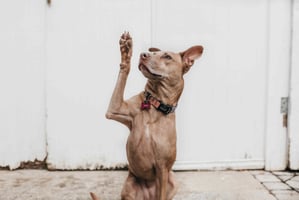House training an adult dog can be a challenge, but with the right guidance, it can be done! This...
How to House Train an Older Dog
Are you looking for ways to house train your older dog? Are you worried that it might be too late to teach your pet the basics of house training? Don't worry, it's never too late to teach your old dog new tricks! In this article, we will provide you with tips and tricks to help you successfully house train your older dog. Read on to find out more!
Why Should You House Train an Older Dog?
House training your older dog is important for a number of reasons. Not only is it important for the health and safety of your pet, it can also help to create a harmonious and stress-free environment in your home. By house training your older dog, you can ensure that your pet will understand the rules of your home and be able to act accordingly when in the house.
House training your older dog can also help to strengthen your bond with your pet. By teaching your pet the basics of house training, you can create a stronger and more meaningful relationship with your pet. This can help to increase your pet's trust in you and help them to feel more secure in their environment.
House training your older dog is an important step in creating a safe and harmonious environment in your home.
How to House Train an Older Dog
House training an older dog can be challenging but with the right approach it can be done. Here are some tips to help you get started:
- Establish a routine: Establishing a routine is key when it comes to house training an older dog. Set regular times for feeding, walking, and playing with your pet to help them get used to their new routine.
- Start with small goals: When house training an older dog, it's important to start small. Begin by teaching your pet basic commands such as sit and stay before moving onto more difficult tasks such as house training.
- Be consistent: Consistency is key when it comes to house training an older dog. Make sure that you are consistent with your commands and that you reward your pet for good behaviour.
- Be patient: House training an older dog can take time and patience. Don't give up if your pet doesn't learn the commands quickly. Stay positive and be patient with your pet.
Common Problems When House Training an Older Dog
House training an older dog can be challenging and there are a few common problems that you may encounter. Here are some of the most common problems when house training an older dog:
- Inconsistent commands: It's important to be consistent with your commands when house training an older dog. If you give your pet different commands each time, they may become confused and frustrated.
- Lack of patience: House training an older dog can take time and patience. If you don't have the patience to teach your pet, they may become frustrated and give up.
- Incorrect rewards: Rewarding your pet for good behaviour is an important part of house training an older dog. If you reward your pet with food or treats, make sure that they are healthy and appropriate for your pet.
By following these tips and being consistent and patient, you can successfully house train your older dog.
Conclusion
House training an older dog can be challenging but with the right approach it can be done. By establishing a routine, starting with small goals, being consistent, and being patient, you can successfully house train your older dog. With the right approach, you can create a safe and harmonious environment in your home and strengthen your bond with your pet.
House training your older dog is an important step in creating a safe and harmonious environment in your home. With the right approach and a little patience, you can successfully house train your older dog.



